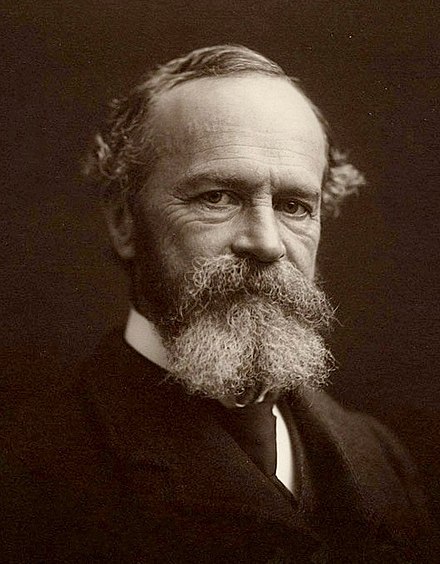88. William James’ Fallacy of Blindness
In his essay “On a Certain Blindness in Human Beings” William James (1842-1910) argues that our ideals and ideas are intimately associated with our feelings. This can be a good thing since feelings both enable our ideas about things to be more comprehensive and allow our ideals to gain significance. Concerning the former, James writes that “wherever there is a conflict of opinion and difference of vision, we are bound to believe that the truer side is the side that feels the more, not the side that feels less” (See The Writings of William James, ed. McDermott, p. 630). Concerning the latter, James writes, “wherever a process of life communicates an eagerness to him who lives it, there the life becomes genuinely significant” (WWJ, 631). But feelings also harbor vital secrets that make these benefits problematic: “Each is bound to feel intensely the importance of his own duties and the significance of the situations that call these forth. But these feelings is in each of us a vital secret, for sympathy with which we vainly look to others. The others are too much absorbed in their own vital secrets to take an interest in ours” (WWJ, 629).
This inevitable absorption in our own projects leads to a certain blindness in human beings: “Now the blindness in human beings…is the blindness with which we are all afflicted in regard to the feelings of creatures and people different from ourselves” (WWJ, 629). In his essay “Human Immortality” James presents this thesis in terms of a logical fallacy, one that you are not likely to find in a logic textbook’s overview of informal fallacies. I refer to it as the fallacy of blindness:
The Fallacy of Blindness: “As they are for you, so you think they positively and absolutely are. I feel no call for them, you say; therefore there is no call for them.” (see The Will to Believe, Dover: 1956, p. 39)
He explains: “It is the most obvious fallacy in the world, and the only wonder is that all the world should not see through it. It is the result of nothing but an invincible blindness from which we suffer, an insensibility to the inner significance of alien lives, and a conceit that would project our incapacity into the vast cosmos, and measure the wants of the Absolute by our puny needs.” (37). Just because you don’t feel and/or understand the significance of someone’s ideals or ideas doesn’t mean that those ideas and ideals are in fact insignificant.
William James
So if feelings give significance to ideas and ideals, and we all lack meaningful access to each others feelings, we can never absolutely judge the ideals and ideas of others. Indeed, the attempt to do so leads to stupidity, injustice, and falsehood: “Hence the stupidity and injustice of our opinions, so far as they deal with the significance of alien lives. hence the falsity of our judgments, so far as they presume to decide in an absolute way on the value of other persons’ conditions or ideals” (WWJ, 629). This would call for a commitment to fallibilism, the view that we can be mistaken, at least as far as our judgments about others are concerned.
But what about judgments about ourselves? In “Human Immortality” James gives us an answer: “Let us at any rate not decide adversely on our own claim, whose grounds we feel directly, because we cannot decide favorably on the alien claims, whose ground we cannot feel at all. That would be letting blindness lay down the law of sight” (45). But I think this contrast James points to in a few places – that we have no ability to feel another person’s ground yet we can directly feel our own – seems too extreme. Surely we can often understand the significance of someone’s motives and feelings better than the person who has them due to the objective distance we may have. And when we are passionately involved with people we seem to share their vital secrets. Even James admits that there are times when we obtain insights that allow us to know another to some extent (WWJ, 634). And can we really always “feel directly” the “grounds” of our own claims? Certainly, this can be denied if we posit an unconsciousness of some sort and recognize to what extent the grounds for our beliefs are irreducible to our self and its conscious control.
Whatever the case may be, it is interesting to ponder the causes for blindness, the extent of our blindness, and what, if anything, we can do to remove some of it. Our minds our selective by nature – something James’ groundbreaking psychological inquiries established. Moreover, we all have limited time and energy to investigate the feelings and ideas of others and very often we lack the good will to really see from their perspectives. James says that “Our deadness toward all but one particular kind of joy would thus be the price we inevitably have to pay for being practical creatures” (WWJ, 634). Again, this may be too extreme. But the point is well taken. The widespread fallacy of blindness is, no doubt, so widespread because the human condition includes inherent tragic exclusions and limitations. But it is unclear how extensive these exclusions and limitations really are. Thus it makes sense to investigate and see if we are all capable of understanding and feeling the lives of others more than we usually do.
To say such change for the better is impossible would allow blindness to lay down the law of sight.
For my post on James’ pluralistic view of the universe and how this new relates to tragedy, go here.
For my post on James’ views on heroism, progress, and tragedy, go here.
For my post on cultivating dialogue with reference to James’ fallacy of blindness, go here.
For my two part series on overcoming polarization and demonization go here.
